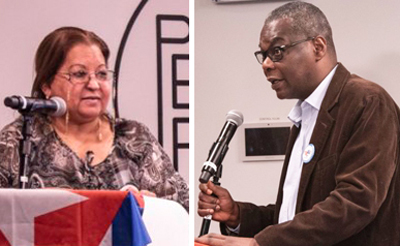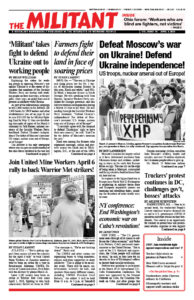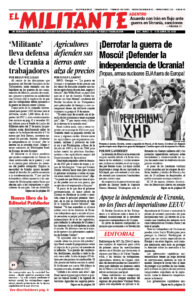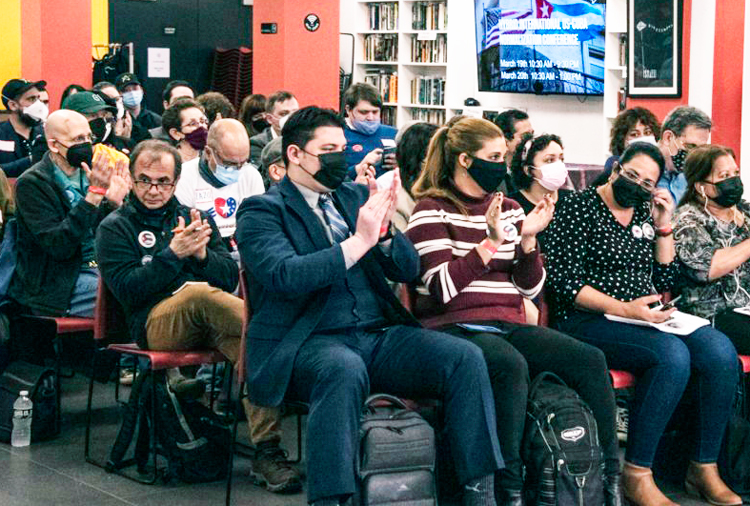
NEW YORK — “The U.S. government seeks through all its means to suffocate the Cuban economy,” said Pedro Luis Pedroso, Cuba’s permanent representative to the United Nations. “But in spite of the U.S. blockade and aggressions, the Cuban people will continue to resist,” he said, as they have for six decades in face of Washington’s efforts to destroy their socialist revolution.
Pedroso was speaking to participants in the March 19-20 International U.S.-Cuba Normalization Conference. The event was sponsored by the National Network on Cuba, the Canadian Network on Cuba, and other groups that campaign for the lifting of U.S. sanctions on Cuba. Some 150 took part in the conference, held here at the People’s Forum.
The high point of the gathering was the participation of a delegation from the Federation of Cuban Women (FMC) as well as from Cuba’s Mission to the United Nations. The FMC delegation was headed by its general secretary, Teresa Amarelle Boué, who is also a member of Cuba’s Council of State. Earlier in the week they addressed the 66th annual session of the United Nations Commission on the Status of Women.
The FMC was forged out of the Cuban Revolution, in which millions of working people, led by Fidel Castro and the Rebel Army, overturned a U.S.-backed dictatorship in 1959 and began to transform society and themselves. Wielding state power, they have confronted and broken down obstacles to women’s participation in all aspects of social and political life.
Amarelle, who was joined by three other FMC leaders, was the featured speaker at a panel on “Cuban Women on the Frontline: Advancing Women’s Human Rights and Cuba’s Families Code.” She described discussions the FMC is helping lead to take on the challenges the Cuban people, including women, face today.
One of the most popular steps being launched today, Amarelle told conference participants, is the extension of child care centers into workplaces.
The FMC leader also described the nationwide discussion currently underway on a proposed “Families Code.” The original Family Code, adopted in 1975, affirmed women’s rights in the workplace and replaced prerevolutionary laws on marriage, divorce, adoption and alimony. The new proposal seeks to take into account the social advances since then and the challenges in Cuban society today.
Over a three-month period concluding April 30, some 78,000 neighborhood meetings are being organized throughout the island where people are discussing the draft Families Code and submitting proposals for changes. After approval by Cuba’s legislature, the National Assembly of People’s Power, the new code will be submitted to a popular referendum. “What we’re bringing into the law,” Amarelle said, aims to address “what exists today in everyday life.”
She said the range of questions being debated includes the expansion of maternity and paternity rights, responsibility for the care of children and older adults, including increased protection for “those most vulnerable in society.” The Family Code “respects all the rights for all people,” Amarelle said, including the wide spectrum of households that exist in Cuba today, from married couples to single parents, children being raised by grandparents, and same-sex couples.
Joining Amarelle at the conference were FMC leaders Osmayda Hernández Beleño, Gretel Marante Rosset and Yamila González Ferrer.
Fight to end Washington’s embargo
Safeguarding the environment and the health and well-being of working people in Cuba today was discussed at the panel “Gender Equality: Key to Tackling Climate Change for Cuba.”
In advance of hurricanes and other natural disasters, the revolutionary leadership trains and mobilizes millions of working people to protect human lives, animals and property. In an online presentation, Helen Yaffe, a professor at the University of Glasgow, Scotland, noted that in the wake of Hurricanes Irma and Maria in 2017, only 10 people died in Cuba — while more than 3,000 were killed in the U.S. colony of Puerto Rico.
The presentations elicited questions and discussion by conference participants on a variety of topics. Apart from the Cuban speakers, however, what was largely absent in the discussion was recognition that what has made the remarkable social gains possible in Cuba — unlike any other country in the world — is the fact that workers and farmers there have made a socialist revolution and for more than 60 years have wielded state power.
At an evening rally, Yuri Gala, Cuban deputy ambassador to the U.N., noted how Cuba’s revolutionary government has effectively confronted the COVID pandemic — despite limited resources due to U.S. sanctions — because of its priority on universal access to public health. Cuba has developed several vaccines of its own and sent thousands of health care volunteers to countries around the world.
Carlos Lazo, founder of Puentes de Amor, which has initiated monthly car caravans in cities worldwide to demand the lifting of U.S. sanctions on Cuba, urged participants to join the March 27 caravan.
In the concluding panel, Gail Walker, executive director of IFCO-Pastors for Peace, outlined some of the organized trips to Cuba and other solidarity activities planned for the coming months. While collecting funds for medical aid and organizing other material help for Cuba is much appreciated there, she stressed, the job of those here in the United States is above all a political one — to fight to end Washington’s decadeslong economic war against Cuba.
The conference closed with an excellent musical trio performance led by Arturo O’Farrill, a Grammy Award-winning Latin jazz artist.


